高中英语牛津译林版模块4 Unit 1 Advertising Grammar and usage(1)-- Direct speech and reported speech 课件(24张PPT)
文档属性
| 名称 | 高中英语牛津译林版模块4 Unit 1 Advertising Grammar and usage(1)-- Direct speech and reported speech 课件(24张PPT) |  | |
| 格式 | zip | ||
| 文件大小 | 1.0MB | ||
| 资源类型 | 教案 | ||
| 版本资源 | 牛津译林版 | ||
| 科目 | 英语 | ||
| 更新时间 | 2019-07-25 10:52:55 | ||
图片预览

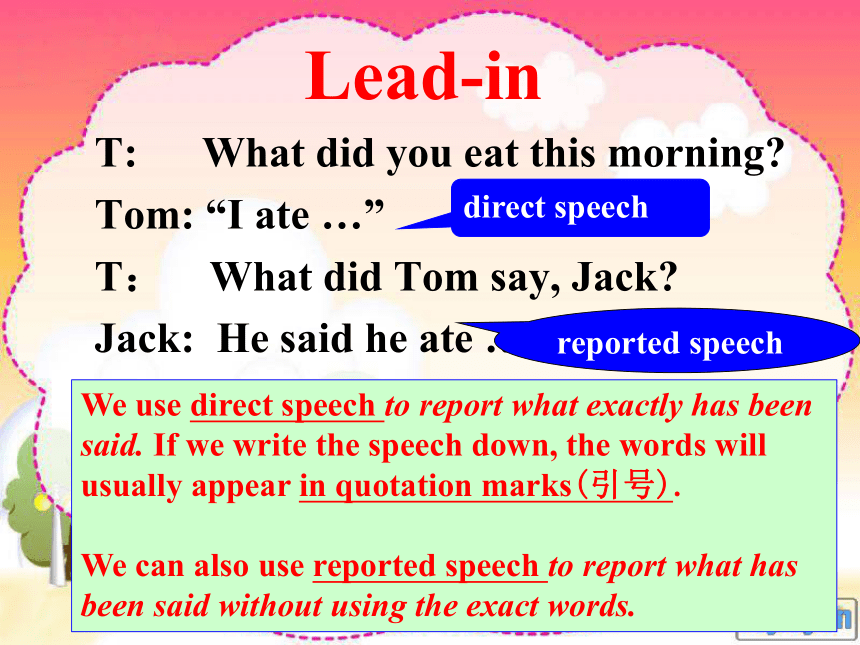

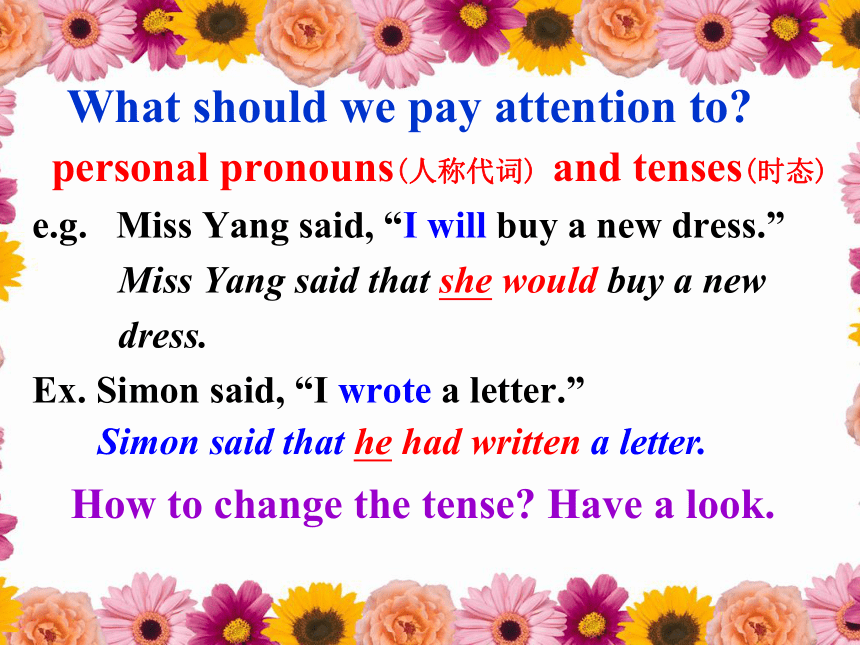
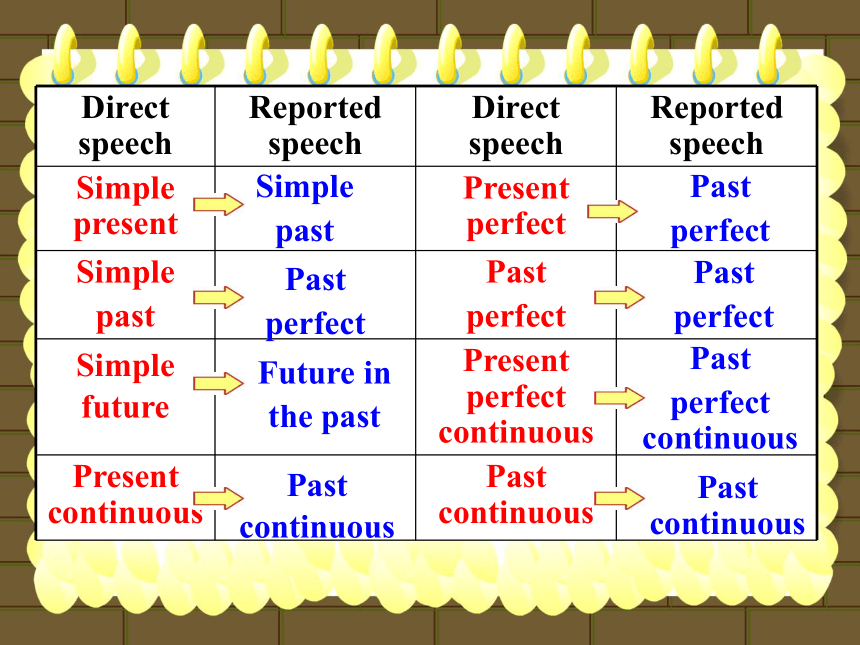
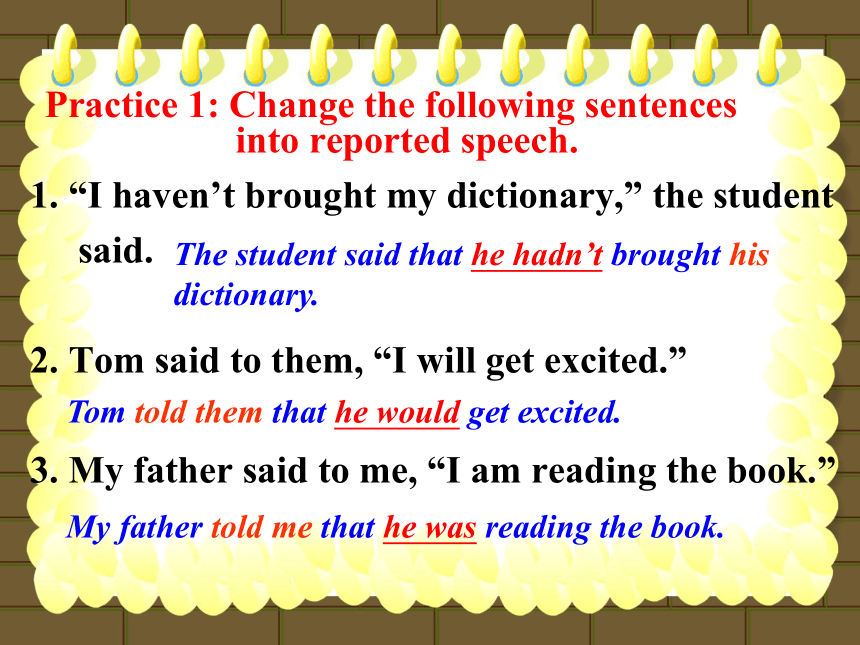
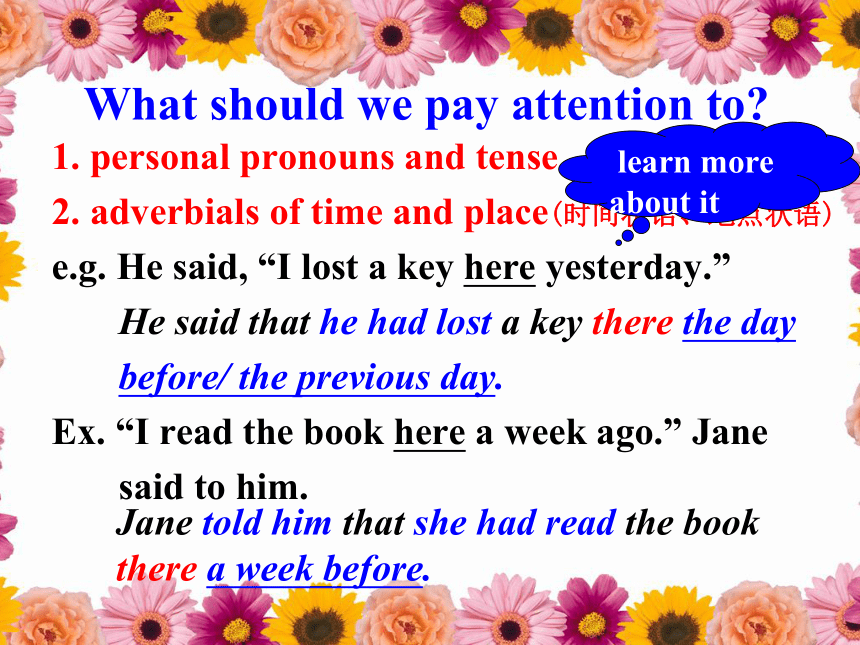
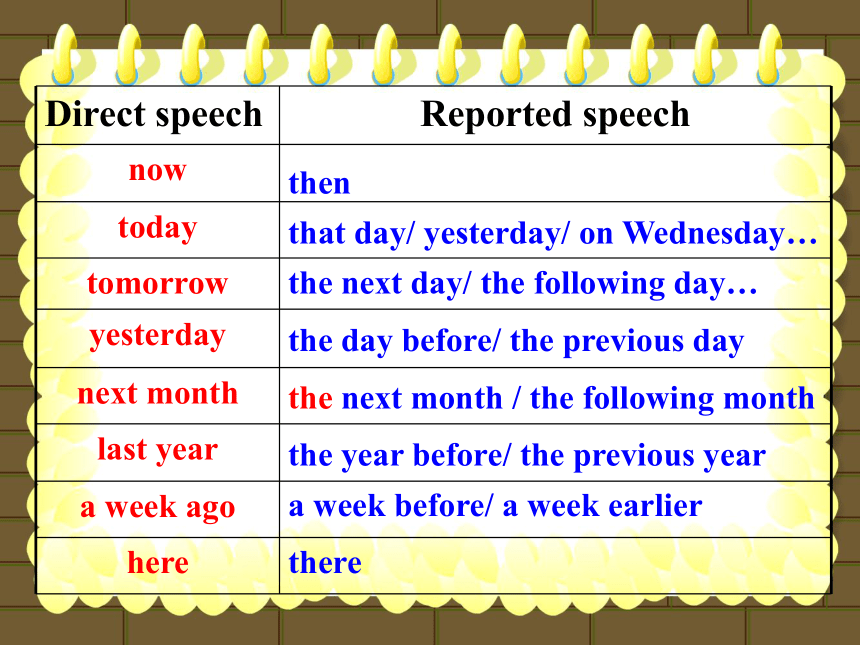
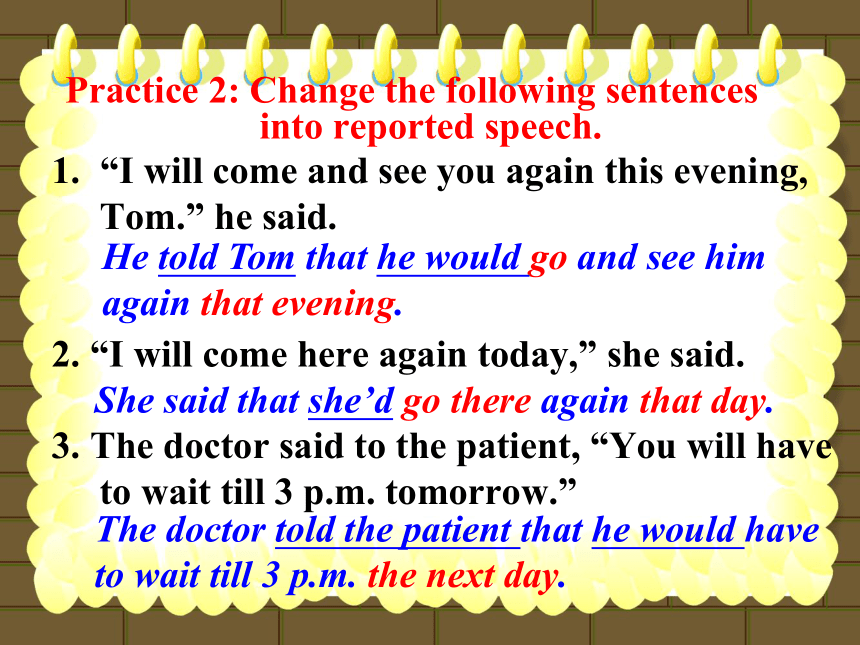
文档简介
课件24张PPT。Grammar and usage
Direct speech & reported speech
直接引语和间接引语dvertisingAM 4 U 1Lead-inT: What did you eat this morning?
Tom: “I ate …”
T: What did Tom say, Jack?
Jack: He said he ate …direct speechreported speechWe use direct speech to report what exactly has been said. If we write the speech down, the words will usually appear in quotation marks(引号).
We can also use reported speech to report what has been said without using the exact words.1. Which one is direct speech and which one is reported speech?
He said, “I will go to school tomorrow.”
She told us something secret.
2. Change the direct speech into reported speech.
She said, “This film is quite interesting.”
“Finish the project tomorrow.” he said to me.
(direct speech)(reported speech)She said that that film was quite interesting.He asked me to finish the project the next day.Change what has been said to an object clause
(宾语从句) or an infinitive phrase.(不定式短语)What should we pay attention to? personal pronouns(人称代词) and tenses(时态)
e.g. Miss Yang said, “I will buy a new dress.”
Miss Yang said that she would buy a new
dress.
Ex. Simon said, “I wrote a letter.”
How to change the tense? Have a look.
Simon said that he had written a letter.Simple
pastPast
perfectFuture in
the pastPast
continuousPast
perfectPast
perfectPast
perfect continuousPast continuousPractice 1: Change the following sentences into reported speech. 1. “I haven’t brought my dictionary,” the student
said.
2. Tom said to them, “I will get excited.”
3. My father said to me, “I am reading the book.”
The student said that he hadn’t brought his dictionary.Tom told them that he would get excited.My father told me that he was reading the book.What should we pay attention to?1. personal pronouns and tense
2. adverbials of time and place(时间状语、地点状语)
e.g. He said, “I lost a key here yesterday.”
He said that he had lost a key there the day
before/ the previous day.
Ex. “I read the book here a week ago.” Jane
said to him.
Jane told him that she had read the book
there a week before. learn more about itthenthat day/ yesterday/ on Wednesday…the next day/ the following day…the day before/ the previous daythe next month / the following monththe year before/ the previous yeara week before/ a week earliertherePractice 2: Change the following sentences into reported speech. “I will come and see you again this evening,
Tom.” he said.
2. “I will come here again today,” she said.
3. The doctor said to the patient, “You will have
to wait till 3 p.m. tomorrow.”
He told Tom that he would go and see him
again that evening.
She said that she’d go there again that day.
The doctor told the patient that he would have
to wait till 3 p.m. the next day.
What should we pay attention to?1. personal pronouns and tense
2. adverbials of time and place
3. other cases(其他情况)thatthosegoNotice直接引语中的谓语动词为一般过去时,如与一个表示过去的时间 in 1992 连用,在变为间接引语时可以不变。
My father said to me, “I read the book in 1986.”
My father told me he read the book in 1986.2. 直接引语表达的意思是客观真理时,在变为
间接引语时时态不变。
The geography teacher said to us, “The earth
goes around the sun.”
The geography teacher told us that the earth
goes around the sun. Student Times: Grammar in use B2即时演练Ⅱ
He said that he really must go.
Tom told me that he could help me with my English.即时演练Ⅲ
He said he was fond of surfing the Internet.
The woman teacher said she was preparing the lessons.
I asked her where she had spent her holiday.
She said that she had gone to Shanghai the week before.
He told me that he had finished his work before I came back.即时演练Ⅳ
was; then
he; the next day
those; his
had been there; before
would go there; thatHow to use reported speech to report?statements(陈述句)questions(疑问句)imperative sentences(祈使句)一般疑问句:whether/ if特殊疑问句:用原来的特殊
疑问词 wh- 或 how用连词 that 引导宾语从句,谓语将祈使句的动词原形变为带to 的不定式,
并在不定式的前面根据句子的意思加 tell/ ask/ advise
等动词,即tell/ ask sb. to do
(否定式加not, 即tell/ ask sb. not to do)动词可用say/ tell/ advise/ agree/ explain/ warn/ suggest… Statements We use noun clauses(名词性从句) introduced by
that to report statements.
She said, “Ads are an important part of our lives.”
She said that ads were an important part of our lives.
“There are two main types of ads,” the writer said to us.
The writer told us that there were two main types of ads.
More reporting words:
“PSAs are often placed for free,” the writer said.
The writer explained that PSAs were often placed for free.advise, explain, insist, promise,
announce, suggest, warn Practice: Change the following sentences into reported speech.1. Tom said, “You’d better translate the book into English.”2. The student said, “ I really don’t know I must finish
the work a week ago.”3. The teacher said, “I will give my students a few
holidays at the end of this month.”Tom suggested that we’d better translate the book
into English.The student explained that he really didn’t know
he must finish the work a week before.The teacher promised that he would give his students
a few holidays at the end of that month.Questions* We use noun clauses introduced by whether/ if
to report yes/ no-questions.
“Are all ads playing tricks on us?” I asked her.
I asked her whether/if all ads were playing tricks on us.
* We use noun clauses introduced by wh-words to report wh-questions.
I asked her, “How can the boy be right?”
I asked her how the boy could be right.
“Where did you find the ads for jobs abroad?” Bill asked.
Bill asked where I had found the ads for jobs abroad.Practice: Change the following sentences into reported speech.1. My mother asked me, “Do you want to go to the
Great Wall with me?”
2. The teacher asked the boy, “How many pages have
you read today?”
3. I asked Li Ying, “Where and when were you born?”
My mother asked me whether I wanted to go to the
Great Wall with her. The teacher asked the boy how many pages he had
read that day.I asked Li Ying where and when he was born.Imperative sentences *To report imperative sentences, we use the structure reporting verb + object + (not) + to-infinitive.
“Don’t worry, Mickey,” Jane said.
Jane asked Mickey not to worry.
*other verbs can be used in this structure
“Don’t believe every ad you read,” Lily said to me.
Lily advised me not to believe every ad I read.reporting verbobject(not)to-infinitiveadvise, encourage, invite, recommend, warnLet’s do some Ex for consolidation! You can do it well!Practice: Change the following sentences into reported speech. 1. My mother said to me, “Don’t take these
weight-loss pills.”2. My brother said, “Come here at once.” 3. My father said to us, “Don’t throw the waste paper
everywhere.”My mother recommended me not to take those
weight-loss pills.My brother ordered me to go there at once.My father warned us not to throw the waste paper everywhere.即时演练Ⅰ
陈述句 that could
(2) 一般疑问句 whether
(3) 特殊疑问句 who could
(4) 祈使句 to close
Student Times: Grammar in use B2ConsolidationCheck grammar work Ⅰ on Student Times.HomeworkFinish Ex on Page 92 and review
the grammar part.
Direct speech & reported speech
直接引语和间接引语dvertisingAM 4 U 1Lead-inT: What did you eat this morning?
Tom: “I ate …”
T: What did Tom say, Jack?
Jack: He said he ate …direct speechreported speechWe use direct speech to report what exactly has been said. If we write the speech down, the words will usually appear in quotation marks(引号).
We can also use reported speech to report what has been said without using the exact words.1. Which one is direct speech and which one is reported speech?
He said, “I will go to school tomorrow.”
She told us something secret.
2. Change the direct speech into reported speech.
She said, “This film is quite interesting.”
“Finish the project tomorrow.” he said to me.
(direct speech)(reported speech)She said that that film was quite interesting.He asked me to finish the project the next day.Change what has been said to an object clause
(宾语从句) or an infinitive phrase.(不定式短语)What should we pay attention to? personal pronouns(人称代词) and tenses(时态)
e.g. Miss Yang said, “I will buy a new dress.”
Miss Yang said that she would buy a new
dress.
Ex. Simon said, “I wrote a letter.”
How to change the tense? Have a look.
Simon said that he had written a letter.Simple
pastPast
perfectFuture in
the pastPast
continuousPast
perfectPast
perfectPast
perfect continuousPast continuousPractice 1: Change the following sentences into reported speech. 1. “I haven’t brought my dictionary,” the student
said.
2. Tom said to them, “I will get excited.”
3. My father said to me, “I am reading the book.”
The student said that he hadn’t brought his dictionary.Tom told them that he would get excited.My father told me that he was reading the book.What should we pay attention to?1. personal pronouns and tense
2. adverbials of time and place(时间状语、地点状语)
e.g. He said, “I lost a key here yesterday.”
He said that he had lost a key there the day
before/ the previous day.
Ex. “I read the book here a week ago.” Jane
said to him.
Jane told him that she had read the book
there a week before. learn more about itthenthat day/ yesterday/ on Wednesday…the next day/ the following day…the day before/ the previous daythe next month / the following monththe year before/ the previous yeara week before/ a week earliertherePractice 2: Change the following sentences into reported speech. “I will come and see you again this evening,
Tom.” he said.
2. “I will come here again today,” she said.
3. The doctor said to the patient, “You will have
to wait till 3 p.m. tomorrow.”
He told Tom that he would go and see him
again that evening.
She said that she’d go there again that day.
The doctor told the patient that he would have
to wait till 3 p.m. the next day.
What should we pay attention to?1. personal pronouns and tense
2. adverbials of time and place
3. other cases(其他情况)thatthosegoNotice直接引语中的谓语动词为一般过去时,如与一个表示过去的时间 in 1992 连用,在变为间接引语时可以不变。
My father said to me, “I read the book in 1986.”
My father told me he read the book in 1986.2. 直接引语表达的意思是客观真理时,在变为
间接引语时时态不变。
The geography teacher said to us, “The earth
goes around the sun.”
The geography teacher told us that the earth
goes around the sun. Student Times: Grammar in use B2即时演练Ⅱ
He said that he really must go.
Tom told me that he could help me with my English.即时演练Ⅲ
He said he was fond of surfing the Internet.
The woman teacher said she was preparing the lessons.
I asked her where she had spent her holiday.
She said that she had gone to Shanghai the week before.
He told me that he had finished his work before I came back.即时演练Ⅳ
was; then
he; the next day
those; his
had been there; before
would go there; thatHow to use reported speech to report?statements(陈述句)questions(疑问句)imperative sentences(祈使句)一般疑问句:whether/ if特殊疑问句:用原来的特殊
疑问词 wh- 或 how用连词 that 引导宾语从句,谓语将祈使句的动词原形变为带to 的不定式,
并在不定式的前面根据句子的意思加 tell/ ask/ advise
等动词,即tell/ ask sb. to do
(否定式加not, 即tell/ ask sb. not to do)动词可用say/ tell/ advise/ agree/ explain/ warn/ suggest… Statements We use noun clauses(名词性从句) introduced by
that to report statements.
She said, “Ads are an important part of our lives.”
She said that ads were an important part of our lives.
“There are two main types of ads,” the writer said to us.
The writer told us that there were two main types of ads.
More reporting words:
“PSAs are often placed for free,” the writer said.
The writer explained that PSAs were often placed for free.advise, explain, insist, promise,
announce, suggest, warn Practice: Change the following sentences into reported speech.1. Tom said, “You’d better translate the book into English.”2. The student said, “ I really don’t know I must finish
the work a week ago.”3. The teacher said, “I will give my students a few
holidays at the end of this month.”Tom suggested that we’d better translate the book
into English.The student explained that he really didn’t know
he must finish the work a week before.The teacher promised that he would give his students
a few holidays at the end of that month.Questions* We use noun clauses introduced by whether/ if
to report yes/ no-questions.
“Are all ads playing tricks on us?” I asked her.
I asked her whether/if all ads were playing tricks on us.
* We use noun clauses introduced by wh-words to report wh-questions.
I asked her, “How can the boy be right?”
I asked her how the boy could be right.
“Where did you find the ads for jobs abroad?” Bill asked.
Bill asked where I had found the ads for jobs abroad.Practice: Change the following sentences into reported speech.1. My mother asked me, “Do you want to go to the
Great Wall with me?”
2. The teacher asked the boy, “How many pages have
you read today?”
3. I asked Li Ying, “Where and when were you born?”
My mother asked me whether I wanted to go to the
Great Wall with her. The teacher asked the boy how many pages he had
read that day.I asked Li Ying where and when he was born.Imperative sentences *To report imperative sentences, we use the structure reporting verb + object + (not) + to-infinitive.
“Don’t worry, Mickey,” Jane said.
Jane asked Mickey not to worry.
*other verbs can be used in this structure
“Don’t believe every ad you read,” Lily said to me.
Lily advised me not to believe every ad I read.reporting verbobject(not)to-infinitiveadvise, encourage, invite, recommend, warnLet’s do some Ex for consolidation! You can do it well!Practice: Change the following sentences into reported speech. 1. My mother said to me, “Don’t take these
weight-loss pills.”2. My brother said, “Come here at once.” 3. My father said to us, “Don’t throw the waste paper
everywhere.”My mother recommended me not to take those
weight-loss pills.My brother ordered me to go there at once.My father warned us not to throw the waste paper everywhere.即时演练Ⅰ
陈述句 that could
(2) 一般疑问句 whether
(3) 特殊疑问句 who could
(4) 祈使句 to close
Student Times: Grammar in use B2ConsolidationCheck grammar work Ⅰ on Student Times.HomeworkFinish Ex on Page 92 and review
the grammar part.
